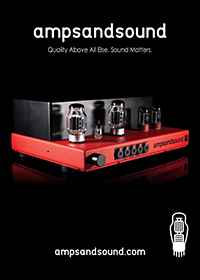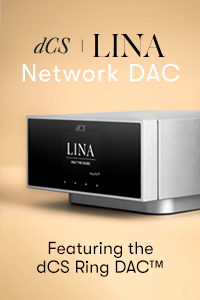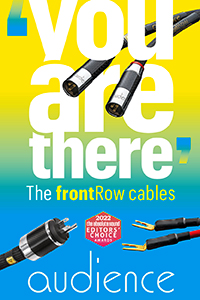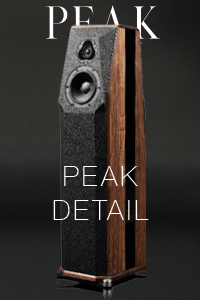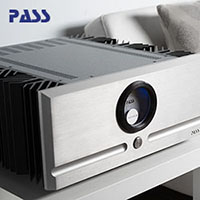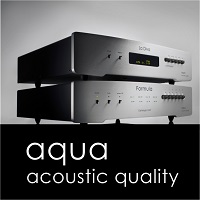 Revisiting Dave Grusin’s classic audiophile album, Discovered Again!, brings back frustrating memories of how amplifiers in the early ’80s didn’t have enough horsepower to do justice to a record with wide dynamic swings. The same dilemma exists when playing many of today’s carefully remastered records with ultra-wide dynamic ranges: Even though there is no obvious distortion, something is still missing. And you don’t know it until you hear what a mega power amplifier can achieve.
Revisiting Dave Grusin’s classic audiophile album, Discovered Again!, brings back frustrating memories of how amplifiers in the early ’80s didn’t have enough horsepower to do justice to a record with wide dynamic swings. The same dilemma exists when playing many of today’s carefully remastered records with ultra-wide dynamic ranges: Even though there is no obvious distortion, something is still missing. And you don’t know it until you hear what a mega power amplifier can achieve.
Forget “simpler is better,” “lower power is better” or whatever other mantra you’ve let yourself be convinced by to avoid making the step up to a high-quality, high-power amplifier. You’re in for a shock the first time you plug the MOON 880Ms into your system. It’s a “space, the final frontier” kind of thing, with the 880Ms opening up a parallel universe where the Enterprise now goes to warp 13, instead of only warp 9.7.
At $42,000 per pair, these amplifiers are not for the faint of wallet—but the only other amplifiers I’ve heard with this kind of jump factor are the $205k-per-pair Boulder 3050s. Instead of spending that kind of cash, you could go with a pair of the 880Ms, Simaudio’s $28,000 MOON 850P preamplifier, your favorite $25k digital front end, a similarly priced analog front end, and maybe $40k for a great pair of speakers. You’ll still have enough cash left over for European delivery of a new Porsche Cayman S and a trip to the Montreux Jazz Festival for a week to take in some great live music. To the right buyer, the MOON 880Ms are a major bargain—it’s all relative.
The Un-Compressor
Thom Yorke’s The Eraser is a fairly compressed recording, as is Supreme Beings of Leisure’s album 11i. The recently remastered Deluxe Version of Thin Lizzy’s Jailbreak feels tighter still. The MOON 880Ms bring these dense albums to life in a way the other amplifiers at my disposal simply cannot do. It’s like driving a high-revving, high-horsepower V-12 supercar that produces its power without the help of a turbo or supercharger—there’s an immediacy to the throttle response that a boosted car never has, even though it may have more torque.
When it comes to amplification, reserve power is essential if you love metal or large-scale orchestral music. Distortion is the enemy of tweeters, and playing metal at high volumes will easily liquefy your speakers if your amplifier can’t deliver massive amounts of ultra-clean power. I don’t think I’ve ever played System of a Down’s single “B.Y.O.B.” as loud as I did with the MOON 880Ms, and it never became painful. These amplifiers are without practical limit, even with my 89-dB speakers. If you have a more sensitive speaker up in the range of 93 to 95 dB @1 watt, like the Focal Grande Utopia EMs, Wilson XLFs or Verity Lohengrins, I’d highly suggest a good calibrated level meter to protect your ears from damage. The extra dynamic range of the MOON 880Ms produces a listening experience so free of artifacts that you’ll likely catch yourself playing music a lot louder than you normally do. And dammit, that’s really cool.
Even at modest levels, the MOON 880Ms sound clearer and more spacious. On Liszt’s Hungarian Rhapsodies for Orchestra, 1-6, from the recent Mercury CD set, the initial attack on the string bass at the beginning of the first piece, combined with the glorious hall ambience, only begins to prepare you for the excitement in store as the full orchestra kicks in about three minutes later. And the tone? Fantastic. Oboes and violins just float silky and softly through the listening space, and are never the least bit grainy. These amplifiers simply do not impose a sonic signature on the music, and they always get out of the way of the presentation. The MOON 880M does run in Class-A mode for the first 10 watts, and the transition to Class-AB at higher levels and power peaks is achieved seamlessly.
Visiting the Simaudio factory last summer, I had the privilege of listening to the MOON 880Ms for the first time, driving a pair of Dynaudio Confidence C1 II speakers in Simaudio’s listening room, which is about 20 feet by 30 feet and expertly tuned to take the room out of the equation. Upon returning home, my own pair of C1s was somewhat disappointing in comparison. As one who loves a good rationalization, I chalked it up to the better room tuning and went about my business.
After properly treating my listening room, that experience was still missing by a substantial margin. The MOON 880Ms in my room convince me that it’s the amplification making the big difference. Though it may come across as controversial to some, especially those who think that speakers are nearly everything, I propose that the amplifier affects the system’s overall sound just as much as the speakers do, if not more. Pairing the MOON 880Ms with some excellent but modestly priced speakers (like the splendid KEF LS50s or the Harbeth Compact 7ES-3s) makes for a bigger, more spacious and detailed sound than connecting a $50k pair of speakers to the best $1,000 integrated amplifier you can find.
Playing Thievery Corporation’s The Richest Man in Babylon is a revelation through these amplifiers, even though I’m sure you’ll be buying a better pair of speakers for the 880Ms in your house. Yet, these great compact speakers, which sound spectacular paired with a Rega Brio-R or a PrimaLuna ProLogue integrated, offer a breathtaking experience with the MOON 880Ms. They now have real bass weight where there was barely any before. Like any of the large floorstanding speakers used for this review, these amplifiers’ enormous power reserves redefine control. This kind of current is not swayed by the reverse EMF generated by the loudspeakers to anywhere near the extent that it is with a small amplifier.
Moving back to my reference GamuT S9s, tracking through DJ Cheb i Sabbah’s La Ghriba: La Kahena Remixed is a religious experience for those worshipping at the temple of mega bass. The throbbing, tribal beats in this record compress my spinal column as the volume approaches club level without a trace of strain, and as the final notes fade to extreme black, it’s tough to find where my room boundaries lie, even with my eyes open. You don’t need to dim the lights to get into a deep, deep, listening experience with these amplifiers.
Of course, the better recordings at your disposal will benefit even further. Aphex Twin’s 26 Mixes for Cash features a broad sonic landscape in all directions, deriving much of it from all the low-frequency bass texture—an area that the MOON 880Ms enhance considerably. Tracking through a large stack of audiophile workhorses, the gestalt of the MOON 880Ms is crystal clear: These amplifiers provide incredible resolution; yet, even after 12-hour listening sessions, they are never fatiguing.
Right Brain, Left Brain
The MOON 880Ms feature top-quality casework, with aluminum enclosures produced in Simaudio’s Montreal facility on its own five-axis CNC mill and anodized to last a lifetime, perhaps longer. (Those wanting a more in-depth view of the company’s operation can click here for our recent visit: <<<INSERT LINK>>>.) Simaudio’s engineers feel that the effort spent on solid casework not only eliminates vibration from the electronic environment, but also makes for stunning aesthetics—again an emphasis on quality and value.
As an added bonus, all this power comes in a relatively compact package. These monoblocks will fit on any rack capable of supporting about 100 pounds each. Simaudio’s high-biased, Class-AB design runs barely warm to the touch, even at high volume levels, and the company uses standard 15-amp IEC sockets. As with the other giant monoblocks reviewed in this issue, the 880Ms will work on a single 15-amp circuit, but will perform even better with a dedicated 20-amp circuit, preferably a pair of dedicated 20-amp circuits.
Lifting the cover reveals a fully balanced design that also has an RCA input for those not having a fully balanced preamplifier. Each amplifier utilizes 32 matched Motorola output devices, along with a pair of 1.3-kV power transformers and 240,000 uF of power-supply capacitance—all contributing to the complete lack of noise in the 800M’s presentation. This is an amplifier that music lovers and technology geeks can both cuddle up to; all the right boxes are ticked. Those wanting a further technological analysis, click HERE.
But don’t call me Shirley. Though a pair of the Simaudio MOON 880M amplifiers costs as much as a 3-series BMW, consider this: These amplifiers will easily last 20 to 30 years without any attention. If you leased a new 3 series every three years for the next 20 years, you’d have spent just over $100,000 and still not have a fixed asset at the end of the term. Considering that over 90 percent of all the Simaudio components ever made are still playing music without effort (and have a 10-year warranty), that pair of 880Ms you buy today will probably still be worth $5,000 to $10,000.
Jay Leno once said that car enthusiasts are either check writers or wrench turners, which also applies to many audiophiles. Taking it a step further, one faction of audiophile is on a quest to swap gear nearly constantly in search of an elusive grail, while another diligently assembles an excellent system and pursues music exploration with fervor. While we won’t pass judgment on either camp here, if you fall into the latter, a pair of MOON 880Ms can be your final destination—even if you swap speakers a few times on your journey, there’s nothing they will not drive.
Factoring that into the equation, the Simaudio MOON 880Ms represent an exceptional value, and are highly deserving of one of our Exceptional Value Awards for 2013. They provide a sonic experience that few amplifiers can match, at any price, and they are built to the highest levels of quality.
Simaudio MOON 880M Mono Reference Power Amplifiers
MSRP: $42,000 per pair
Peripherals
| Analog Source | VID Acutus Reference SP turntable TriPlanar arm Lyra Atlas cartridge AMG V-12 turntable AMG arm Clearaudio Goldfinger cartridge |
| Phonostage | Simaudio MOON 810LP Indigo Qualia |
| Digital Source | dCS Vivaldi stack Sooloos C-15 Aurender S10 Simaudio MinD |
| Preamplifier | Simaudio MOON 850P Audio Research REF 5SE Robert Koda K-10 |
| Speakers | Dynaudio Confidence C1 II Sonus faber Aida GamuT S9 |
| Cable | Cardas Clear |






